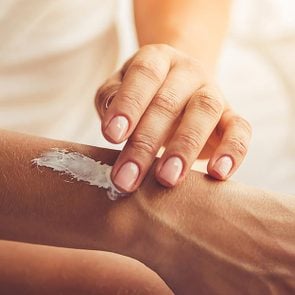Should You Buy Organic Skin Care? What Dermatologists Want You to Know
Updated: Dec. 02, 2020
Dermatologists explain what "organic" means when it comes to skin care and discuss whether you should buy only organic skin care products.
Our editors and experts handpick every product we feature. We may earn a commission from your purchases.
The use of organic products
By now, you’ve seen the word “organic” on everything from produce and packaged foods to clothing and skin care products for the face and body.
For food to carry the official organic seal, it must be grown and processed using strict federal guidelines that focus on everything from natural pest and weed control to natural living conditions for livestock. Organic foods can’t be processed with artificial colors, preservatives, or flavors and require that all their ingredients be organic with few exceptions, according to the U.S. Department of Agriculture (USDA).
Essentially, the term organic means that a product contains naturally sourced ingredients that are grown in accordance with organic methods—without the use of pesticides, synthetic fertilizers, growth hormones, antibiotics, or genetically modified organisms (GMOs), explains Blair Murphy-Rose, MD, New York City-based dermatologist and clinical assistant professor at NY Presbyterian Hospital–Weill Cornell Medical Center.
“Organic products are inherently ‘clean’ and free of parabens, sulfates, phthalates, PEG [polyethylene glycol] compounds, petrochemicals, and mineral oils,” she adds.
Products can receive four different levels of certification from the USDA:
- 100 percent Organic: The product contains only organically produced ingredients like raw, unprocessed farm products.
- Organic: The product contains at least 95 percent organically produced ingredients. Most non-organic products are only permitted if organic versions aren’t available.
- Made with Organic Ingredients: The product contains at least 70 percent organic ingredients and there are some rules about the remaining ingredients.
- Specific Ingredient Listings: Products with less than 70 percent organic ingredients can’t use the term “organic” on the main packaging but can identify certified organic items in the ingredient list.
What does “organic” mean when it comes to skin care?
While organic foods are well regulated in the United States, the skin care category is a bit of a gray area. Despite all the clean and clear organic regulations from the USDA, the agency doesn’t oversee skin care products—that job belongs to the U.S. Food and Drug Administration (FDA)
“There is no formal regulation or definition in place by the FDA—rather, cosmetic products that are labeled as organic must comply with both the U.S. Department of Agriculture for the organic claim and the FDA for labeling and safety requirements for the cosmetic component,” explains Marisa Garshick, MD, a board-certified dermatologist at Medical Dermatology & Cosmetic Surgery (MDCS) in New York.
“More specifically, the USDA oversees the National Organic Program which includes a definition of organic and provides certification for those ingredients that meet the criteria,” she says. There’s no such definition for certification for skin care products, though manufacturers can use USDA-certified organic ingredients in their products. (Beware of these dangerous beauty trends.)
Should you buy organic skin care products?
Most dermatologists agree that there’s no need to shop the “organic” label when it comes to your skin care products. What’s more important is shopping for items that work well for your skin type, notes Dr. Garshick.
“There are some skin care brands that happen to be organic that offer great products, while there are also numerous skin care brands that are not thought of as organic, but are frequently recommended by dermatologists,” she says. (Try these DIY skin care treatments from dermatologists.)
It’s also important to pay attention to the ingredients list even if a product says it’s organic or naturally derived. Just because something is naturally derived doesn’t automatically mean it’s good for the skin.
“Some natural substances can be irritating to the skin and some natural ingredients—when in their pure or natural form—may not necessarily be safe or effective for use on the skin,” says Dr. Garshick. “That said, if a patient of mine finds a product that is organic that is working really well for their skin and as a result, their skin is well-hydrated, protected, and taken care of, I would not tell them to discontinue it.”
Dr. Murphy-Rose agrees with the notion that “organic” does not always mean safe. “All-natural and organic products are often more difficult to preserve and therefore potentially more risky and subject to contamination and microbial growth,” she says. “The organic label is more for marketing than for true health and safety.”
How to shop for safe skin care
Whether organic or not, here’s a guide to help you shop for skin care that’s safe, high-quality, and healthy for your skin.
Become familiar with reading ingredient lists
Brendan Camp, MD, a Manhattan-based dermatologist at MDCS Dermatology, recommends looking for ingredient lists that offer transparency to the consumer.
“Keep in mind that the first five ingredients in a list are often thought to account for a majority of the product,” he says.
If you don’t know what those first five or so ingredients are—and can’t seem to make sense of them when you do some research—chances are they aren’t the best skin care products out there.
(Got old makeup? Beware, this is what happens when you use expired makeup.)
Find a product that works well for you and your skin
It is important to do your research and speak to a board-certified dermatologist or skin care professional to know what ingredients would work best for your skin, notes Dr. Garshick.
“If you have sensitive skin, it is best to avoid products with harsh ingredients, abrasive scrubs, or fragrances as these can be irritating to the skin,” she says. “If you are oily, it is best to look for products that are oil-free and non-comedogenic.” (These are the best foundations for your skin.)
Cost does not necessarily correlate with effectiveness
Joshua Zeichner, MD, director of cosmetic and clinical research in dermatology at Mount Sinai Medical Center tells his patients not to shop by price tag, but to instead look for fragrance-free products.
“Products without fragrance minimize risk of developing skin allergies,” he says. “If it sounds too good to be true it likely is.”
Organic skin care products dermatologists recommend
If you want to try out some organic skin care products, here are the ones dermatologists say are worth considering.
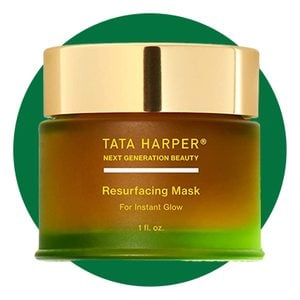
Tata Harper Resurfacing Mask
$65
“This mask includes 18 high-performance botanical ingredients including white willow bark, acting as a beta-hydroxy acid, and pomegranate enzymes to help brighten the skin and improve skin texture,” says Dr. Garshick. “In this mask, according to the company, 100 percent of the total ingredients are from natural origin, while 82 percent of the ingredients are from organic farming.” (Check out the best sleeping facial masks.)
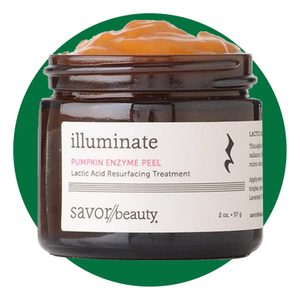
Savor Beauty Pumpkin Enzyme Peel
$80
“This enzyme peel uses certified organic pumpkin puree and lactic acid to help brighten, smooth, and soften the skin while also gently exfoliating and reducing the appearance of blemishes,” says Dr. Garshick. “Not only does this peel leave your skin glowing, but it also gives off the most perfect fall scent, making it an easy choice this time of year.” (Learn more about the health benefits of pumpkin.)
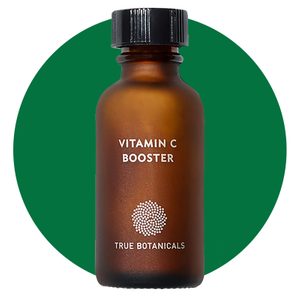
True Botanicals Vitamin C Booster
$90
Vitamin C is one of the most powerful antioxidants for your body and skin, and when coupled with the other nourishing ingredients in this True Botanicals serum, such as organic tapioca starch and ferulic acid, it helps brighten skin and improve the appearance of fine lines and wrinkles, says Dr. Garshick. “The company notes that the products are all made with Made Safe Certified Ingredients and are packaged and shipped in a way to minimize the impact on the environment,” she adds.
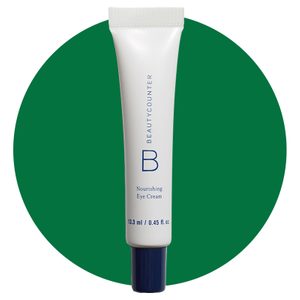
BeautyCounter Nourishing Eye Cream
$31
This lightweight eye cream uses aloe and organic coconut oil as its two main ingredients. “Both aloe and coconut oil work to provide moisture to the sensitive under-eye area and help give a refreshed, hydrated appearance,” says Dr. Garshick. “As a company, BeautyCounter is transparent about what is in their products and has committed to various safety standards, including sourcing, manufacturing, and testing.” (Here’s the makeup trick to hide under-eye circles.)


